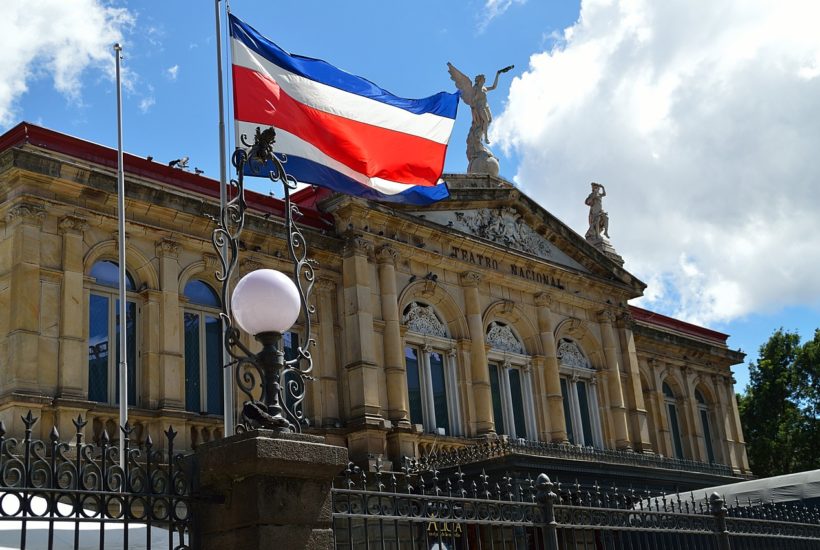Crypto
Costa Rica Proposes a 13% Tax on Cryptocurrency Purchases
Last August, the president of the Central Bank of Costa Rica, Rodrigo Cubero, recommended citizens to use cryptocurrencies “with caution” since they are not legal tender in the country and ruled out the use or initiative of law to work in a CBDC scheme. Now a tax of 13% on cryptocurrency purchase might become law in the country, to discourage crypto transactions.

Although it never states that cryptocurrencies are prohibited, Costa Rican regulators seek to discourage the purchase and sale of Bitcoin, Ethereum, or Solana, with taxes of 13% per value, as well as on profits per taxpayer.
In Costa Rica, the Union of Chambers and Associations of the Private Business Sector (Uccaep) and the General Directorate of Taxation, agreed in a resolution to levy 13% Value Added Tax (VAT) on the purchase and sale of crypto assets in the country.
Costa Rica’s economic regulator seeks to apply taxes to the main cryptocurrencies handled in the market, such as Bitcoin, Ethereum, Solana, and other digital assets. According to local media El Economista, the taxation is based on the fact that the central bank defined cryptocurrencies as “intangible assets” and not as currencies for everyday use.
Read more about the tax on cryptocurrency purchases in Costa Rica and find the latest business headlines with the Born2Invest mobile app.
Crypto taxes
Last August, the president of the Central Bank of Costa Rica, Rodrigo Cubero, recommended citizens to use cryptocurrencies “with caution” since they are not legal tender in the country and ruled out the use or initiative of law to work in a CBDC scheme.
Rodrigo Cubero even revealed that he does not consider necessary a digital currency in the country and recommended users of exchanges and cryptocurrencies to do so with caution, “at their own risk”, since there is no law prohibiting their use.
Costa Rica remains flexible on the use of cryptocurrencies
The Central Bank of Costa Rica maintains that cryptocurrencies are assets that have no physical representation and are proposed by private agents using a global platform and that they cannot be considered legal currency because they do not meet these characteristics.
This was explained by the general director of Taxation, Carlos Vargas: “What we are trying to clarify is what is the tax treatment that, according to the current regulations this type of assets is going to have, understanding that they are not currencies because this has been defined by the Central Bank by denying them the character of currency because we have to define precisely what we are talking about.”
Carlos Vargas added that since they (cryptocurrencies) are bought at one price and sold at another, they are subject to a tax of up to 15% on capital gains, while the taxpayer would have to pay other taxes on profits.
Meanwhile, conflicting opinions persist in Costa Rica, as Francisco Villalobos, former general director of Taxation considered that “it is questionable” the VAT on cryptocurrencies since the same taxation legislation “would be assuming the illegality” of cryptocurrencies that so much points out, and would give them the weight of a legal tender and not an asset.
At the end of October, Costa Rican entrepreneurs unveiled the first digital mining center for cryptocurrencies, the Data Center, which will mine with renewable energy, fiber optics, temperature, and humidity monitoring, in a self-sufficient way, only paying the rent of the site where it is established.
__
(Featured image by jconejo via Pixabay)
DISCLAIMER: This article was written by a third party contributor and does not reflect the opinion of Born2Invest, its management, staff or its associates. Please review our disclaimer for more information.
This article may include forward-looking statements. These forward-looking statements generally are identified by the words “believe,” “project,” “estimate,” “become,” “plan,” “will,” and similar expressions. These forward-looking statements involve known and unknown risks as well as uncertainties, including those discussed in the following cautionary statements and elsewhere in this article and on this site. Although the Company may believe that its expectations are based on reasonable assumptions, the actual results that the Company may achieve may differ materially from any forward-looking statements, which reflect the opinions of the management of the Company only as of the date hereof. Additionally, please make sure to read these important disclosures.
First published in be [IN] crypto, a third-party contributor translated and adapted the article from the original. In case of discrepancy, the original will prevail.
Although we made reasonable efforts to provide accurate translations, some parts may be incorrect. Born2Invest assumes no responsibility for errors, omissions or ambiguities in the translations provided on this website. Any person or entity relying on translated content does so at their own risk. Born2Invest is not responsible for losses caused by such reliance on the accuracy or reliability of translated information. If you wish to report an error or inaccuracy in the translation, we encourage you to contact us.

-

 Cannabis7 days ago
Cannabis7 days agoSouth Africa Proposes Liberal Cannabis Regulations with Expungement for Past Convictions
-

 Biotech2 weeks ago
Biotech2 weeks agoVolatile Outlook for Enlivex Therapeutics as Investors Await Clinical Catalysts
-

 Crypto2 days ago
Crypto2 days agoCrypto Markets Under Pressure as Vitalik Buterin Sells 17,000 ETH
-

 Markets1 week ago
Markets1 week agoWeather-Driven Supply Outlook Lifts Coffee Markets in Brazil and Vietnam























